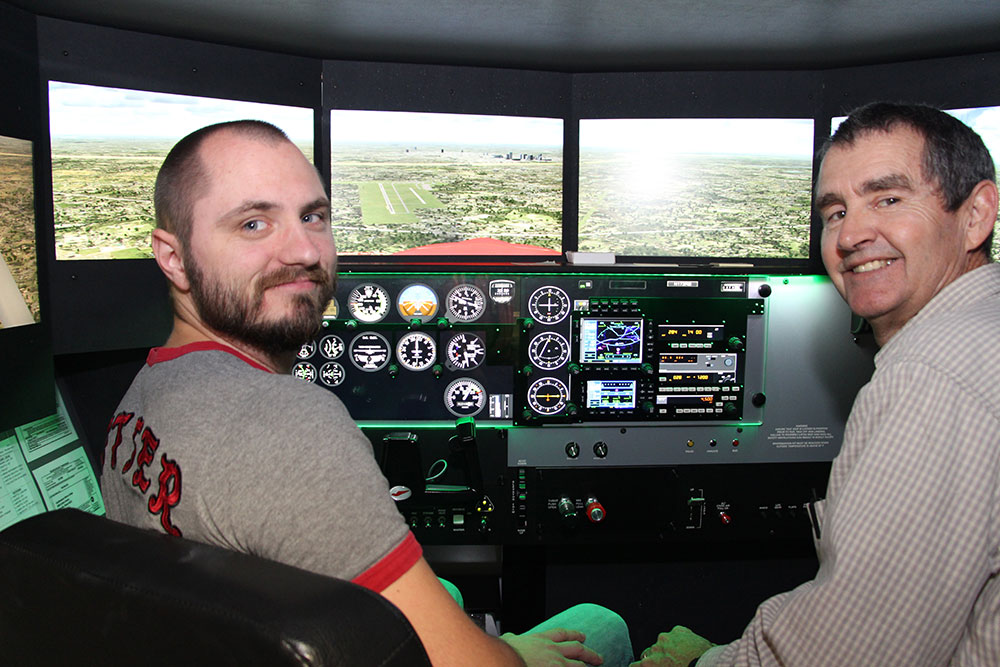
While the aviation industry has sustained a huge decrease in the demand for air travel due to the impact of COVID-19, it will rebound in time. Eventually the focus will shift back to the challenges the industry was facing before the pandemic—specifically a serious shortage of skilled professionals to fill a myriad of openings in the aviation field. Southwestern Illinois College (SWIC) remains committed to addressing that shortage by offering FAA-certified degrees and certificate programs.
Keith Mueller, Coordinator of Aviation Pilot Training/Aviation Management at SWIC, has been associated with SWIC’s aviation program since 1975, and he believes it has helped launch thousands of careers since debuting 51 years ago.
Today, SWIC’s aviation degree programs prepare students for fast-paced, in-demand, well-paying careers as pilots or in the fields of aviation maintenance and aviation management. An Aircraft Dispatcher Program was added in 2016 when it earned FAA Certification, and is now one of the few existing programs in the Midwest and among the lowest cost programs in the country. Plans are in the works for an Avionics Certificate Program to be added, along with an Unmanned Aeronautical Vehicle (Drone) Certificate program.
As SWIC’s programs continued to grow in recent years, an agreement was established with Southern Illinois University Carbondale (SIUC) to provide a pathway for SWIC students to transfer 100% of credit earned in any of the SWIC aviation programs to continue on to obtain a bachelor’s degree in the Aviation Degree Program at SIUC’s campus. By 2015, the relationship had evolved to include the SIUC Extended Campus program at SWIC, through which the Bachelor of Science in Aviation can be completed in a weekend format at the Belleville SWIC campus.
“It’s a combination through which students can earn their BS in Aviation at a substantially reduced cost and it works great for folks who may already be working in some capacity in the industry,” said Mueller.
SWIC also partners with various major employers in the aviation sector to help provide internship and apprenticeship opportunities, so students have ample opportunities to gain hands-on experience. West Star Aviation, for example, provides transportation for small groups of high school students to visit its facilities to learn about operations. Before COVID-19, West Star was putting together a new program so that college students would spend four hours a day at one of its facilities learning about safety around aircraft and engaging in technical work to sharpen their skills. The other four hours, they would spend in class at SWIC. Upon graduation, they would be prepared to begin their careers as an airframe power plant technician. Mueller is confident the program will launch soon, and other programs are also in the works, including one being spearheaded by Gulfstream at its St. Louis Downtown Airport facility.
With the St. Louis region being home to five airports and one of the nation’s largest aerospace manufacturing clusters, the demand for individuals with these skills and experience is strong in the bi-state region. Despite COVID-19, there are indications that demand is growing. Mueller points to Flying Colors, a global aviation company in Chesterfield, Mo., as an example, noting the company currently has 200 employees and expects to be at 700 employees in the next five years.
“Growing the labor force is key to attracting more aerospace and aviation companies to the region,” Mueller said.
In recognition of its substantial contribution to aviation in the State of Illinois, SWIC has been selected by the Illinois Aviation Hall of Fame to receive the 2020 Spirit of Flight Award. SWIC is one of only three colleges in the history of the award to earn this recognition and is the first ever two-year college to receive the award.
